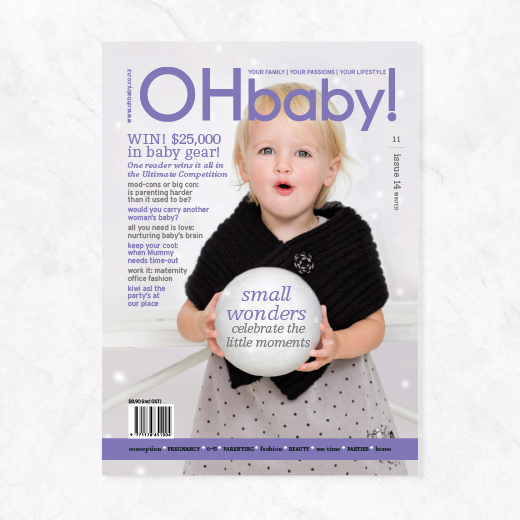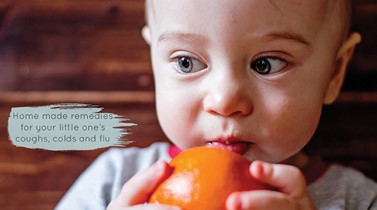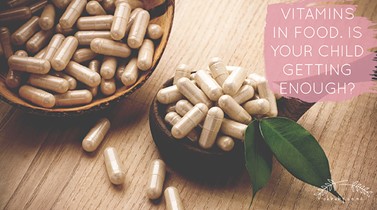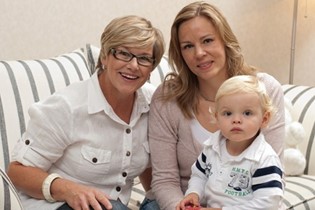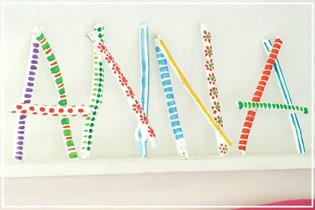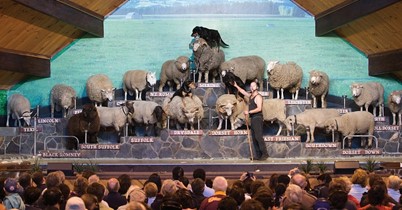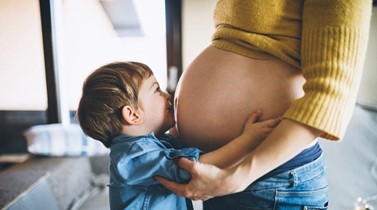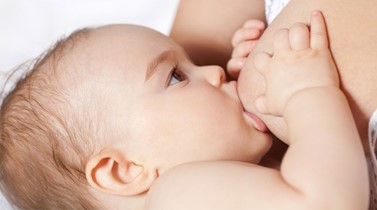Baby's brain development and the implications for raising a child
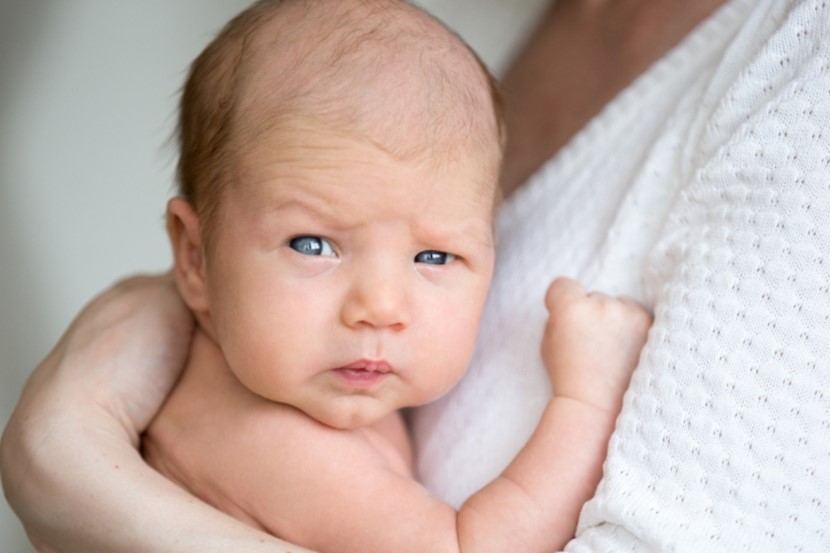
Ever wanted to know what's going on in your baby's head? Miriam McCaleb reports on the latest findings in brain development that could have major implications for how you raise your child.
I've got some shocking news about your baby. Her brain is more active than yours. Your habits are likely to affect her for a lifetime. And she needs your love and nurturing way more than she needs clothes, toys or a learn-to-read programme. When we think about early brain development, or even our own brain function, people often think about school success, high test scores or university scholarships. We hear "brain" and we think "brainy".
A more helpful framework for thinking about brain development is to acknowledge that the brain controls our everything. Yes, our ability to do well at school, but also our ability to return a serve in tennis, to sing in tune or to make friends - it's our brain that enables us to read and respond to the facial cues of other people. Our brain decides whether to marry that guy, to overtake that car, to have that extra glass of wine. It is our brain that remembers the punch lines to jokes, puts the dishes away without breaking anything and keeps us calm (or not) when we get up to our teething baby for the third time in a night. So when we think about brain development, we are thinking about the whole of a person - the three-dimensional, marvellous mess of humanity.
What's more, we know that our cognitive ability - that is, our ability to think logically, to do well in exams - largely rests upon our social and emotional development. And all this depends on the sort of nurturing we have received early in our life story.
How do we know all this? Well, during the 1990s brain-imaging technologies evolved so we could peer inside the skulls of living beings. A US presidential proclamation declared the '90s "the decade of the brain". We learned more about brain function and development in those few years than we had learned in the previous few centuries. Now we know that the human brain develops in a unique way, unlike any of our other organs. It is not fully formed at birth, like its compatriots the heart or liver, but instead does most of its growing in the early years of a person's life.
Making brain waves
At birth, a baby's brain weighs around 350g. By her first birthday, that has doubled. By the time she heads off to school, her brain will weigh 90% of its eventual adult weight. And because humans are inherently social, the brain development is happening in the context of relationships. University of Canterbury lecturer and Brainwave Trustee Nathan Mikaere-Wallis says, "You could think of our brains as social organs. It's been described as love becoming flesh."
During infancy and toddlerhood, our brains are a hive of electrical energy. When an infant has an experience for the first time, it causes an electrical spark inside a brain cell (neuron), commanding the neuron to connect with another neuron. At birth our brains have completed about 15% of these connections, with the earliest years' experiences sparking the creation of the other 85%.
The experience may be, "being cradled lovingly in Dad's arms and watching his eyes crinkle when he smiles at me". The learning here might be something as simple yet profound as "there are people who care about me" or "it feels good to give and receive love".
The next time the infant has that same experience, the electrical current passes more easily between those cells because there is an existing pathway (synapse, or synaptic connection).
Neurons that fire together...
When we practise something many times the cells involved in that learning formalise their synaptic connections by wrapping them securely in a fatty substance known as myelin. Once a synapse is fully myelinated, the electrical currents involved in the learning can travel 250 times faster, as on auto-pilot. Or, as they say, "neurons that fire together, wire together".
You might recognise the feeling. Remember learning to drive? When you first had your learner's licence it was probably an exercise in concentration to avoid bunny-hopping as you deliberately thought, "Clutch in, over and up to first gear, clutch slowly off now and accelerate gently ... sweet ... OK, second gear..." These days, you can probably change gears without really thinking about it. The difference is in the myelin. Myelin supports those synapses because your brain recognised that this was an experience you'd repeated enough to expect that you would be repeating it again in the future.
So we would want to be equally deliberate about the sort of experiences that our babies have early in their lives. Are the hands that hold baby gentle or rough? Are the voices patient or harsh? Are the faces surrounding baby warm or angry? Is baby responded to or ignored?
In these early relationships and experiences, we are setting children's auto-pilots. Consider this: we're born with more neurons than we need: between 100 and 200 billion at birth. All of us naturally lose about 40% of the brain cells we're born with when we're around age three. Which do we keep? We will keep the neurons that we use most often. We will keep the cells that are involved in well-myelinated pathways. So the learning that happens in our earliest years has implications across the lifespan. That is to say, we will hardwire the experiences that we have most frequently early in our lives.
Solid foundations
Imagine the networks of the brain are like a grapevine, and the three-year-old loss of neurons like an approaching winter. The process of pruning away the weaker connections (that is experiences we've had less frequently) will strengthen the connections that remain (the experiences we have often).
This is not to say that change is impossible - we are always capable of forming new connections and creating new habits of mind. But if we think of building a brain as like building a house, it will be simplest and most cost-effective to get the foundations right the first time. The same is true for baby.
Remember, it's not as though your baby's brain can differentiate between "good" experiences and "bad" ones. Unfortunately, connections aren't myelinated according to a criterion of "this will serve me well in the future, I'll keep it" or "this is an unhelpful pattern of behaviour, I will prune this". Instead, we keep the connections that are involved in the experiences we have most often, whether that's an awareness of the give-and-take of conversation (that's what mimicking those infant coos is all about) or having experienced a world where violence and intimidation are successful strategies for getting needs met.
When we consider the crucial role of nurture for building healthy brains, it is interesting to do so within the New Zealand context, where we parent our young in a culture that has historically urged us to "harden up", a culture that perhaps still prizes self-sufficiency and stoicism more than warmth or weepiness.
The biological reality is that we cannot get to healthy emotional control without passing through softness and nurture. Think of our mighty rugby players keeping calm and rational even amidst intense expectations and heightened stress responses. Being able to do this requires a mastery of one's biology that is best achieved by being sensitively cared for early in life.
Self-regulation
That ability to calm oneself down is known as "self-regulation", and it's a field of human development that has a lot of experts talking. The thoroughly unscientific way that I describe self-regulation is the ability to get yourself back into balance when you're out of whack. Out of whack might mean "I'm hungry", it could be "I'm angry", even "I need to go to the bathroom!"
Self-regulation is what happens when we have strategies to manage our own inevitable storm clouds of disregulation (out-of-whack-ness). "I'm hungry - I've snacked, now I'm better." Or it can be: "I'm angry - I'll breathe deeply, now I'm better." Or even: "I need to poop! OK, I did that, now I'm better." It takes humans decades to learn how to self-regulate, and some of us haven't mastered it even as we approach our senior years. So how do we learn this vital skill?
Renowned Canadian researcher, teacher and philosopher Stuart Shanker summarises: "It's by being regulated that the child develops the capacity to self-regulate at the biological level."
Being regulated - this is what the fortunate children of attuned parents have happen to them over and over on any given day. When we feed a hungry infant, when we soothe an upset baby, or make him comfortable with a clean, dry nappy, we not only foster healthy brain development, but we provide our services as an external regulator. That is to say, we support them to feel better whenever they are out of whack.
Over time, little by little, our children gradually assume more and more responsibility for managing their own regulation. They become self-regulated.
So contrary to what the "harden up" school of parenting would have us believe, responding to a baby's cries is not spoiling him, it's not (heaven forbid!) teaching him to be soft. It is, in fact, supporting the biological processes that will mean he can keep his head and kick the winning conversion in the Rugby World Cup of 2031, for example. No pressure!
The essential trio
In order to be able to provide the sort of care that supports these essential processes, parents are well served to consider the three key concepts as identified by international relationship expert and founder of the Centre For Attachment, Lauren Porter. She says that what babies need most is: "Proximity, sensitivity and responsiveness".
To expand: proximity means we first need to be near our babies - close enough to hear their cries and observe their physicality.
Next, we need to be sensitive enough to recognise what their vocalisation or body movements tell us. Is this baby hungry? Tired? Uncomfortable? And the final point is key: we must then be responsive. This means we take our cue from baby and provide him with what he needs. Hungry baby? Feed him! Tired baby? Time for a sleep!
When children are cared for in this way a remarkable thing happens. These are the parenting behaviours that support a secure attachment relationship, but they are the same practices that will support baby's slowly emerging ability to self-regulate, and foster optimal brain growth. It's like a three for the price of one deal.
So whether our motivation is a settled baby, a loving relationship or a future full of juicy brain power and calm self-regulation, providing proximity, sensitivity and responsiveness (as often as we are able!) is a strategy for success.
Ideas for being with baby
Here are a few suggestions of ways to interact with your baby to help build those well-myelinated pathways:
Do what I do, say what I say: From the time baby is just a day or two old, she will imitate your facial expressions. Make a big wide mouth… and wait. Try poking out your tongue… and wait. She'll copy you! Provide words for what you're doing: "Baby, you made your hand pat your leg. Pat, pat, pat! I can do it too! Pat, pat, pat." The rewards come in earnest from about six weeks old, when baby learns to smile - copying you - and your parental sun comes out!
Baby chat: By the time she's about 12 weeks old she'll be cooing gently and will probably start to fll in the gaps of conversation. So leave her lots of time and space to "reply" when you talk to her. "Ata marie! Good morning darling!" (Wait! Wait… wait some more…) "Did you have a lovely sleep?" (allow a big enough pause and she'll vocalise). "You did? Great! Shall we open the curtains?" (Wait… wait… be patient…)
Self talk: The number of words that are spoken directly to children before they're three predicts things such as IQ scores and school success. Self talk is the name theorists give to our chat when we're describing what it is that we're doing. "OK, I need to hang this load of washing. I'll fnd my basket and put all the wet clothes in here…"
Parallel talk: This is when you're describing the things that baby is doing: "You're having a big drink of milk, eh love?" Or: "You are stretching your legs so far that you've moved all the way off your blanket!" In this way, children come to associate the things that they (or Dad or Mum) are doing with the words and sounds that accompany them.
Reminiscing about the day: From the time baby is small incorporate a daily reflection into the night-time routine. "I had a lovely day with you today, baby! Let's think about what we did. We fed the ducks, didn't we? And that great big duck came so close to your stroller, remember? Poppa came over for lunch, and he had his woolly hat on. I wonder what adventures we will have tomorrow?" Not only does this habit support all sorts of intricate processes involved in the recall of experiences, it gives clues to the inner world of your toddler as she gains language and shares her highlights.
Hold me close and rock me: Wrapping your baby securely in loving arms is one of the best things you can do to nurture the foundation of her brain development. If you haven't experimented with babywearing (such as slings) give it a go. Similarly, never underestimate the value of letting baby hang out or sleep on your chest - skin to skin if it's warm enough. Your comforting smell, your reassuring heartbeat - all of this has profound benefits. Gentle rocking in Mum or Dad's arms also provides a metronome of calm for baby. Neuroscientist Bruce Perry says this is one of the key experiences in wiring a brain capable of optimal growth.
Sing to me!: All over the world for millennia, humans have sung to their offspring. There are many reasons for doing so - it supports development of language, it soothes agitation and it boosts learning-enhancing hormones in the brain, such as endorphins. Nursery rhymes exist for good reason. Kiwi Julie Wylie is an internationally recognised expert at creating music that's perfect for children. I also recommend artists such as Dan Zanes, Elizabeth Mitchell and the Baby Dub or Putamayo world music collections for music that's as groovy as a café soundtrack. Guess what else? Your baby will benefit from anything that you sing! Make up songs, change the lyrics to any song you like and turn it into anything you want! Don't be shy - if you can talk, you can sing.
RELATED STORIES:
- VIDEO: newborn to toddler milestones
- VIDEO: Watch baby Zac's first year in milestones
- PRINTABLE: Fun Milestone cards
- Little steps: Baby's milestones over 18 months
- Typical child development
- Encouraging baby's development
- Why a mother's love improves their baby's health
- 3 Techniques to understand what your baby is saying
Further reading:
* The Science of Parenting by Margot Sunderland
* Why Love Matters by Sue Gerhardt Parenting from the Inside Out by Daniel Siegel
* Born for Love by Maia Szalavitz & Bruce Perry
* From Neurons to Neighbourhoods by Jack Shonkoff (ed)
* www.baby.geek.nz
* www.developingchild.net
* www.centreforattachment.com
* www.brainwave.org.nz
Miriam McCaleb is a mother, a writer, a founding member of the Brainwave Trust in the South Island, and the force behind www.baby.geek.nz. She says, "The geek shall inherit the earth." As a passionate believer in the power of play to transform, teach and heal, she often enjoys hanging out at the kids' table more than with the adults.

AS FEATURED IN ISSUE 14 OF OHbaby! MAGAZINE. CHECK OUT OTHER ARTICLES IN THIS ISSUE BELOW
